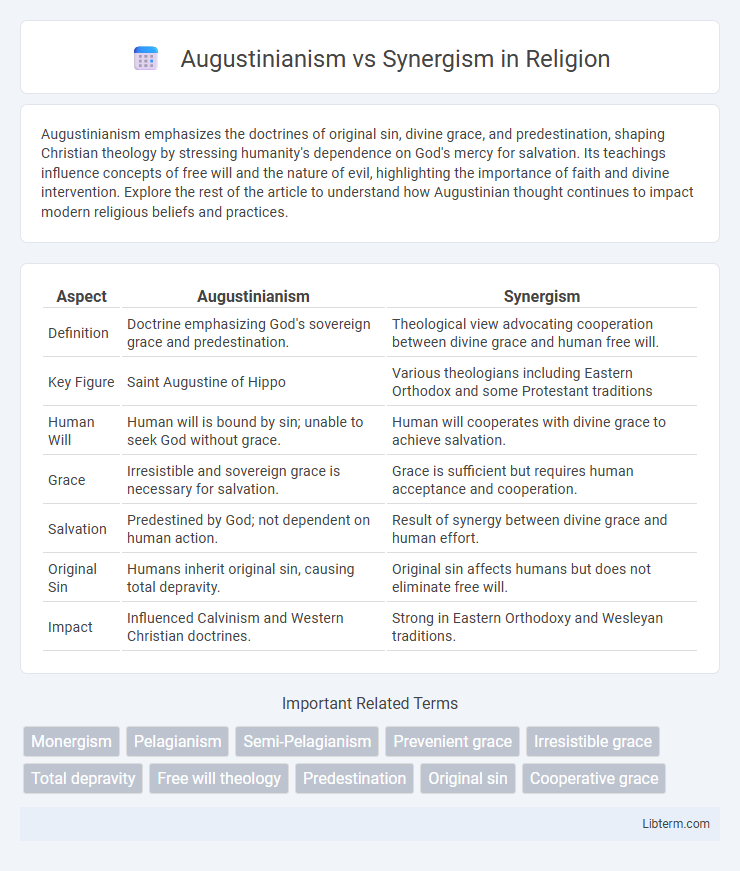Augustinianism emphasizes the doctrines of original sin, divine grace, and predestination, shaping Christian theology by stressing humanity's dependence on God's mercy for salvation. Its teachings influence concepts of free will and the nature of evil, highlighting the importance of faith and divine intervention. Explore the rest of the article to understand how Augustinian thought continues to impact modern religious beliefs and practices.
Table of Comparison
| Aspect | Augustinianism | Synergism |
|---|---|---|
| Definition | Doctrine emphasizing God's sovereign grace and predestination. | Theological view advocating cooperation between divine grace and human free will. |
| Key Figure | Saint Augustine of Hippo | Various theologians including Eastern Orthodox and some Protestant traditions |
| Human Will | Human will is bound by sin; unable to seek God without grace. | Human will cooperates with divine grace to achieve salvation. |
| Grace | Irresistible and sovereign grace is necessary for salvation. | Grace is sufficient but requires human acceptance and cooperation. |
| Salvation | Predestined by God; not dependent on human action. | Result of synergy between divine grace and human effort. |
| Original Sin | Humans inherit original sin, causing total depravity. | Original sin affects humans but does not eliminate free will. |
| Impact | Influenced Calvinism and Western Christian doctrines. | Strong in Eastern Orthodoxy and Wesleyan traditions. |
Introduction to Augustinianism and Synergism
Augustinianism emphasizes the doctrine of predestination and the total depravity of humanity, asserting that God's grace is the sole source of salvation and that humans cannot contribute to their own redemption. Synergism, in contrast, teaches that salvation involves cooperation between divine grace and human free will, where individuals play an active role in accepting or rejecting God's offer of salvation. The theological debate centers on the extent of human agency and God's sovereignty in the process of salvation.
Historical Origins and Development
Augustinianism originated with St. Augustine in the 4th and 5th centuries, emphasizing divine grace as the sole source of salvation, rejecting human cooperation in the process. Synergism arose later, particularly within Eastern Orthodox and some Protestant traditions, advocating a cooperative interaction between divine grace and human free will in salvation. The historical development of Augustinianism shaped Western Christian doctrines on predestination, while Synergism influenced Eastern Christianity's emphasis on synergy between God and humanity.
Core Doctrines and Theological Principles
Augustinianism emphasizes monergism, teaching that salvation is solely the work of divine grace without human cooperation, rooted in doctrines of total depravity and irresistible grace. Synergism asserts cooperative human free will in salvation, aligning with conditional election and prevenient grace that enables response to God's call. Theological principles in Augustinianism prioritize divine sovereignty and predestination, while Synergism upholds human responsibility and the capacity to accept or reject grace.
Divine Grace: Monergism vs. Synergism
Augustinianism emphasizes monergism, asserting that Divine Grace alone effects human salvation without human cooperation, highlighting God's sovereign will as the decisive factor. Synergism, prevalent in various Christian traditions, teaches that Divine Grace initiates salvation but requires human free will to cooperate in the process. The debate centers on whether salvation is entirely a work of God (monergism) or a cooperative process involving both Divine Grace and human response (synergism).
Human Free Will and Divine Sovereignty
Augustinianism emphasizes divine sovereignty by asserting that God's grace irresistibly determines human salvation, minimizing human free will's role in initiating faith. Synergism maintains a cooperative interaction where human free will actively participates with divine grace in the salvation process. The tension between God's sovereign election and human volition defines the core theological divergence between both doctrines.
Salvation: Predestination or Cooperation?
Augustinianism emphasizes salvation as predestined by God's sovereign will, asserting that God's grace irresistibly brings the elect to faith without human cooperation. Synergism argues that salvation involves a cooperative process where human free will plays a role in accepting God's grace, making faith a joint effort between divine initiative and human response. This theological contrast centers on whether salvation is solely an act of divine predestination or a synergistic collaboration between God and humanity.
Key Theologians and Influential Figures
Augustinianism, rooted in the teachings of St. Augustine of Hippo, emphasizes divine grace as the sole cause of salvation, asserting human will is incapacitated by original sin. Synergism involves key figures like John Wesley and Jacob Arminius, who argue that human free will cooperates with God's grace in the salvation process. Both theological perspectives have profoundly shaped Christian doctrines on grace, free will, and predestination throughout church history.
Scriptural Basis and Interpretations
Augustinianism emphasizes predestination and irresistible grace, relying heavily on Romans 9 and Ephesians 2:8-9 to affirm God's sovereign election in salvation. Synergism highlights human free will cooperating with divine grace, drawing from passages like Philippians 2:12-13 and Deuteronomy 30:19 to support a cooperative role in faith and repentance. Both frameworks interpret Scripture to address the tension between divine sovereignty and human responsibility in the salvation process.
Impact on Christian Traditions and Denominations
Augustinianism emphasizes predestination and God's sovereign grace, profoundly shaping Roman Catholic, Reformed, and some Protestant denominations by underscoring human inability to achieve salvation without divine intervention. Synergism, which highlights cooperative human free will and divine grace, significantly influences Arminianism, Wesleyan, and many Pentecostal traditions, promoting a theology where human response is essential in the salvation process. The doctrinal divergence between these views impacts liturgy, evangelism, and soteriology, creating distinct theological identities among Christian communities globally.
Contemporary Debates and Relevance
Augustinianism emphasizes divine sovereignty and predestination, asserting that God's grace alone initiates and completes salvation, while Synergism advocates for human cooperation with divine grace in the salvation process. Contemporary debates focus on the implications for human free will, moral responsibility, and the nature of grace, influencing Protestant and Catholic theological dialogues. This discussion remains relevant in pastoral counseling, ecumenical dialogues, and the development of Christian ethics amidst modern existential and pluralistic challenges.
Augustinianism Infographic

 libterm.com
libterm.com